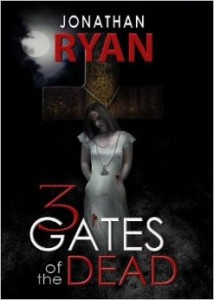
Jonathan Ryan
Premier Digital Publishing
2013
Reviewed by Michael Collings
Jonathan Ryan’s 3 Gates of the Dead, the first book in his 3 Gates Series, does not read like a novel…or, rather, it reads like the best kind of novel. There is much about the book that should militate against it, particularly as a horror novel intended for a general market; the most important point, perhaps, is that it focuses on religion and religious issues—overtly, in characters, events, and content; and covertly, as it were, in theme and subtext. Yet, for equally specific reasons, it does succeed and succeeds admirably.
Much of that success occurs because—to repeat myself—it reads like the best kind of novel, surmounting many of the limitations implicit in horror and religious fiction. For me, it does so through its essential authenticity: authentic characters, both religious and non-religious, speak to each other and to readers using authentic language, diction, and tone, to explore what turn into authentic-seeming encounters with the supernatural. Ryan’s skill is such that for long passages, I forgot I was reading as a reviewer; forgot that, as always, I was reading as an unofficial and impartial pseudo-editor; forgot everything except what was happening to Pastor Aiden Schaeffer, Detective Jenifer Brown, Father Neal and his band of unofficial ghost hunters, and the rest of the cast involved in investigating the bloody and mysterious death of Aiden’s fiancé. With each complication and each successive murder, 3 Gates drew me further in and further into a world in which science and religion have much to teach each other.
Appropriately enough, the book begins with Aiden’s acceptance of a terrible truth: “I don’t know if I believe in God anymore”—a heart-wrenching and life-changing statement for the assistant pastor at a rigidly Presbyterian church. Coupled with Aiden’s loss of his parents a year before and a subsequent break-up with his fiancé, this additional burden threatens to be too much for him…until he becomes involved with discovering who murdered his fiancé and why.
It is not coincidental that much in the opening pages deals with Richard Dawkins’ The God Delusion and how reading it helped bring Aiden to a state of disbelief; this sets the stage for the gradual alterations in his understanding of himself, of his ties with religion, of the nature of belief and faith, and of the nature of the universe itself. Eventually, the precepts of science are brought to bear in testing religion; as Father Neal explains midway through the book, “Think about the scientific method. You have a theory, and then you test it to see if it’s true. If the test holds up, you stay with that theory until something comes that changes that.” For Aiden, for whom the visible world has been all that he could accept, clear evidence of an invisible world and its intrusions into his until-then comfortable view of reality require that he re-think everything that he thought he knew.
There is more that I could explore about 3 Gates of the Dead, including the deft way in which Ryan acknowledges and exploits (in the best way) his debt to two previous writers of religious supernatural fiction: C.S. Lewis (for my comments on this influence, please see my earlier review of Dark Bride at http://michaelrcollings.blogspot.com/2015/02/jonathan-ryan-dark-bride-3-gates-of.html), who contributes important elements of setting and tone at precisely the right moments; and Charles Williams, one of the Inklings and thus a friend of Lewis’, who is referred to in the story, again at the most appropriate moments. However, I think what is more important to say is simply this: 3 Gates of the Dead is a near-flawless examination in fiction of true-to-life conflicts, contradictions, and ultimate reconciliations between two modes of knowing, between the objective and the subjective, between the visible and the invisible, and between doubt and faith. And, it provides a perfect springboard—as it was designed to do—into the remainder of the complex story of Pastor Aiden Schaeffer.
Highly recommended.
- Killing Time – Book Review - February 6, 2018
- The Cthulhu Casebooks: Sherlock Holmes and the Miskatonic Monstrosities – Book Review - January 19, 2018
- The Best Horror of the Year, Volume Nine – Book Review - December 19, 2017
- Widow’s Point – Book Review - December 14, 2017
- Sharkantula – Book Review - November 8, 2017
- Cthulhu Deep Down Under – Book Review - October 31, 2017
- When the Night Owl Screams – Book Review - October 30, 2017
- Leviathan: Ghost Rig – Book Review - September 29, 2017
- Cthulhu Blues – Book Review - September 20, 2017
- Snaked: Deep Sea Rising – Book Review - September 4, 2017


